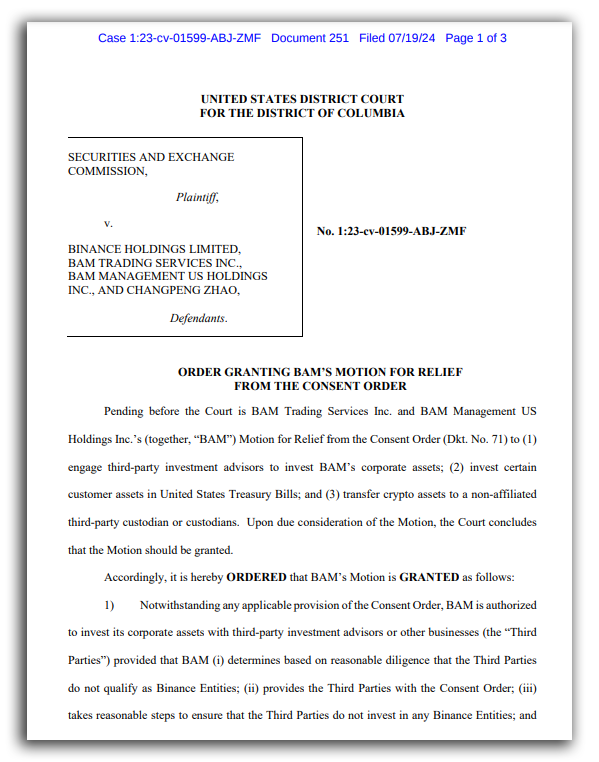Investing Client Funds in US Treasury Accounts!

On July 19, a US court granted Binance permission to invest client funds in US Treasury accounts. According to an order from the United States District Court for the District of Columbia, Binance can invest “certain” customer funds through a third-party investment manager. Binance must ensure that these funds are not returned to the company or any related parties.
What does this mean for Binance and its customers?
The court order requires Binance to include in its monthly trading expense reports the costs associated with holding US Treasury investments held in custody. In addition, Binance must detail these costs in its operational reports. This move could signal the cryptocurrency's potential role in supporting the US dollar amid BRICS governments' dollar reform efforts. Experts suggest using collateralized stablecoins to extend the dominance of the US dollar by buying and holding US debt instruments. This approach will help offset high inflation caused by years of weak monetary and fiscal policies.
The Role of Stablecoins
Tether's USDT stablecoin is a prime example. In the year By 2023, Tether will hold $72.5 billion in US Treasuries, rivaling the holdings of some developing countries. Tether emphasizes overbought, a stablecoin pegged to the dollar, to hedge against major market declines. Former US House Speaker Paul Ryan suggests how a stablecoin could solve the debt crisis. He also pointed out that a stable currency will help the US dollar to be competitive in the international trade market. These tools support fiat-equivalent token value.
Judgment approval details
Earlier this week, Binance requested court approval to invest about $40 million in $10 million increments over four weeks. Judge Amy Berman Jackson upheld that request, allowing the exchange to allow its clients' fiat funds to invest in US Treasury bills.

A trading account at TreasuryDirect handles these investments, and they mature on a rolling four-week basis. Binance must maintain sufficient funds on the platform to meet all expected customer withdrawal requests. It should also update the terms of use to inform customers about this new investment strategy.
Key conditions and compliance
The court granted Binance several other requests, including permission to engage third-party investment advisors to manage its corporate assets. In addition, Binance may transfer assets to a third-party custodian not located in the United States. The judge emphasized that Binance must control the new private and administrative keys for these wallets through its US employees or a third-party custodian.
Legal and strategic implications
The US Securities and Exchange Commission (SEC) is currently involved in an ongoing legal battle with Binance US, a subsidiary of the global Binance exchange. Despite these challenges, the court's approval will allow Binance to diversify its investments and improve security and returns for its users. Investing in US Treasury bills provides liquidity and predictable returns, making it a good option for preserving capital while earning moderate interest.
looking forward
This move not only reinforces Binance's financial strategy, but also sets an example for other cryptocurrency exchanges. By complying with transparency and legal requirements, Binance aims to build trust and ensure the safety of its customers' assets. As the crypto market continues to evolve, such strategic decisions will play an important role in shaping the future of digital finance.













